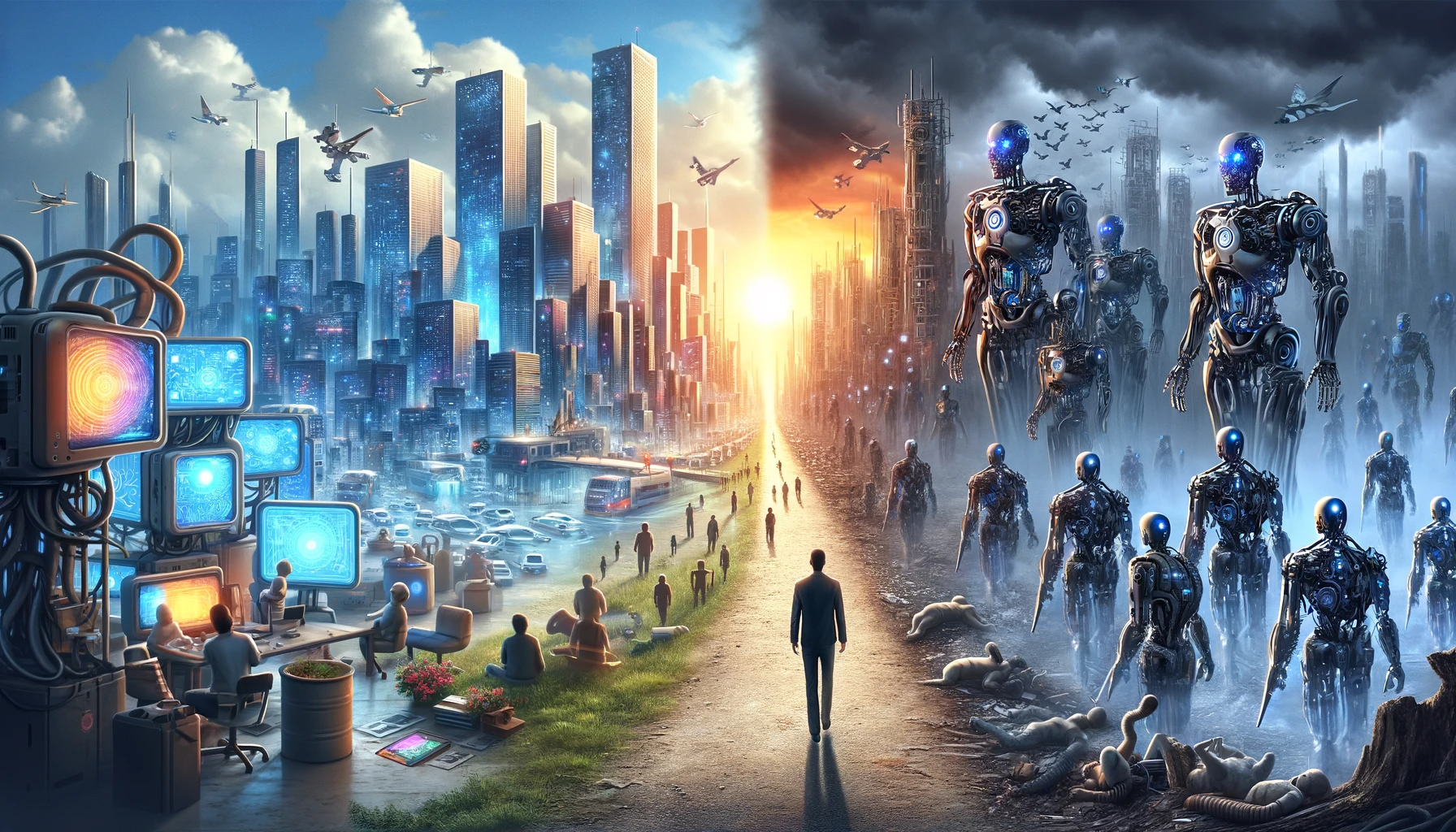
As we start the new year, are you fearful or hopeful about AI?
Do you believe AI will lead us towards abundance or devastation?
During my upcoming Abundance Summit in March, we’ll be discussing these and other questions as part of what I’m calling “The Great AI Debate.”
In today’s blog, let’s take a look at the top 5 reasons to be fearful about AI in 2024, and the top 5 reasons to be hopeful. On the whole, I remain convinced that AI is the single most important technology we’ve ever created—and one that has the greatest potential to uplift humanity.
Top 5 Reasons to be Fearful…
#1 – The 2024 US Presidential Election (“Patient Zero”)
The potential for AI-driven electoral interference looms large. Eight years ago, Cambridge Analytica spent millions to target political advertising and influence voter opinions in the 2016 US Presidential Election. In 2024, it’s not unreasonable to believe that teenagers using generative AI on their laptops could unleash unprecedented havoc, deploying deepfakes and propagating misinformation to undermine candidates and sway public opinion.
The use of enhanced microtargeting in political campaigns could exploit voter biases, further polarizing the electorate. Additionally, AI-influenced social media algorithms may skew discourse, fostering echo chambers. In the context of this upcoming election cycle, which is part of the largest ever global electoral year with an estimated 4 billion voters across 60 countries, there is a critical need for vigilance against AI’s manipulative potential in politics.
#2 – Unemployment Due to AI
In the shadow of AI's rapid advancement, an unsettling future looms for the job market. A sobering forecast by Goldman Sachs suggests that 300 million jobs could be lost to automation in the next decade, with up to two-thirds of US jobs at risk. A recent ResumeBuilder survey of 750 business leaders utilizing AI illuminates a disturbing trend: 37% acknowledged AI replaced workers in 2023, with 44% anticipating layoffs in 2024 due to AI’s efficiencies.
This upheaval leaves college graduates facing a vanishing skilled labor market, compounded by the lingering trauma of the COVID-19 pandemic. Such a scenario is a perfect storm for social unrest, elevating urgent questions about retraining, upskilling, and the feasibility of universal basic income (UBI) as a cushion against the disruptive tide of AI-induced job displacement. The risks are not just economic but deeply social, poised to exacerbate existing inequalities and challenge the very fabric of our workforce.
#3 – Enforcement of AI Laws
In 2024, the task of navigating the complexities of AI regulation, especially in the wake of the European Union's pioneering AI Act of December 2023, presents intricate challenges. The inherent complexity and ever-evolving nature of AI technologies call for deep technical understanding from regulators, a resource that is often scarce. With AI companies operating globally, cross-border enforcement adds further layers of jurisdictional complexity, underscoring the difficulty of applying regional regulations like the EU's in an interconnected world.
The global landscape is rife with the potential for misinterpretation and inconsistent enforcement, which is further exacerbated by the rapid pace of AI advancement that risks rendering regulations quickly outdated. This raises a key question: How do we ensure that AI regulations are fair, agile, and keep pace with technological advancements? Of even greater concern is that those most likely to misuse AI for criminal or terror purposes are least impacted by proposed AI Laws.
#4 – AI-Powered Cyberattacks & Hacks at Scale
In 2024, AI-powered cyberattacks pose a formidable threat, revolutionizing the scale and sophistication of digital warfare. AI enables the rapid, widespread exploitation of vulnerabilities, drastically accelerating attack timelines. Cybercriminals, now armed with AI, have the ability to launch adaptive malware and more sophisticated social engineering attacks, including personalized phishing and convincing deepfakes.
This democratization of advanced cyber tools extends beyond well-funded groups to individuals, significantly heightening risks across sectors. The potential for AI to disrupt critical infrastructure is alarming, with legal and ethical frameworks struggling to keep pace. Such AI cyberattacks and hacks will only be prevented by more powerful AIs under “white hat” control.
#5 – Loss of Privacy and Surveillance
AI's intrusion into privacy and its enhanced surveillance capabilities pose alarming risks. AI's processing of vast personal data could lead to new forms of surveillance by governments and corporations, threatening to erode privacy and encouraging the potential misuse of data. Mass surveillance now reaches beyond online activities to physical movements, communications, and biometric data, ushering in an era of continuous monitoring and a society where privacy is increasingly rare.
Predictive analytics in AI raises concerns about covert manipulation in personal decision-making. Moreover, AI-enhanced cyber surveillance and smart devices in private spaces risk becoming tools for data misuse. The sanctity of public anonymity is jeopardized by AI-based facial recognition. As legal and ethical frameworks lag in addressing these challenges, and the emerging reality of AI-driven social scoring systems signals a move towards digital authoritarianism, there is an urgent need to balance technological advancement with privacy rights.
Top 5 Reasons to be Hopeful…
#1 – AI Continuing to Advance Healthcare
AI's role in healthcare is pivotal, especially in personalized medicine. By tailoring treatments to individual genetic profiles, AI markedly enhances therapies for diseases like cancer and heart disease. Today’s advanced AI-driven diagnostic tools now outperform humans in accuracy, enabling earlier disease detection, crucial for effective treatment. The year 2023 witnessed a milestone when AI-discovered antibiotics emerged, tackling drug-resistant staph infections and antimicrobial resistance. This breakthrough achievement underscores AI’s transformative impact, heralding a new era in drug discovery and offering new hope against previously untreatable infections.
AI's influence extends across healthcare: from remote patient monitoring to mental health support, and from precision robotic surgery to streamlined healthcare administration. Each innovation marks a step towards a future of more efficient, accurate, and accessible healthcare.
#2 – Tesla Releasing an Update to FSD
The automotive world is eagerly anticipating a significant update to Tesla's Full Self-Driving (FSD) AI, as hinted by Elon Musk. Accentuating the novelty of the system's architecture, Musk recently tweeted, "It is already on a lot of cars, but, given that it is a completely new architecture, we are doing extra testing." This update, currently excelling in California, is being refined for areas with heavy precipitation.
FSD Beta V12, a seismic shift from rules-based to network-path-based AI, signals a new era of enhanced safety and intuitiveness, making decisions based on human driving data. Over 15,000 Tesla employee vehicles are testing this version, with a customer release expected soon. Tesla's relentless innovation is evident in their recruitment efforts for the AI team, aiming to build next-generation autonomy. The upcoming release of V12 marks a pivotal moment in vehicular technology, moving closer to a future where AI-driven cars ensure safer, more efficient travel.
#3 – AI Enhancing Education
AI in education is not just transformative—it’s revolutionary, personalizing learning to each student's pace and style, making education more accessible and effective. Intelligent tutoring systems provide tailored support, effectively bridging educational divides in underprivileged areas with high-quality resources. Automated grading and feedback offer immediate learning insights, while AI tools adapt content for students with special needs, skillfully overcoming language barriers and disabilities.
Moreover, AI's analysis of educational data enlightens curriculum development and teaching strategies, making decisions data-driven. Virtual and augmented reality tools create immersive, interactive learning environments, dramatically enhancing engagement in subjects like science and history. AI-powered language apps offer personalized language learning, and streamlined administrative tasks empower educators to focus on teaching. In this way, AI also guides students in career choices and skill development, further democratizing education and shaping a future where learning is a right for all.
#4 – Ongoing Democratization of AI via Open-Source Models
The further democratization of AI through open-source models in 2024 will mark a significant leap, making AI's transformative power accessible beyond corporate confines. This shift fosters enhanced accessibility and collaboration, allowing a diverse array of individuals and organizations to innovate and contribute to AI. Economically, it levels the playing field, especially for startups and smaller companies, creating new opportunities and stimulating market dynamism.
In education and research, these open-source models serve as invaluable learning and exploration tools, nurturing future AI talents and encouraging groundbreaking research. Ethically, a broader contributor base ensures more balanced, equitable AI development, addressing diverse societal needs. Ultimately, this democratization empowers global problem-solving, applying AI to tackle complex challenges across various sectors, and increasing the potential for innovative breakthroughs.
#5 – Increasing Human-AI Collaboration and Creativity
The fusion of human creativity and AI's analytical prowess will continue to revolutionize industries. AI copilots are amplifying human potential, encouraging extraordinary creativity and problem-solving across various domains. In creative fields, they're enabling artists, musicians, and writers to explore new expressions. In scientific research and development, AI is an invaluable partner, aiding in the unveiling of groundbreaking discoveries through the analysis of complex data.
Meanwhile, businesses are leveraging AI for strategic insights, enhancing decision-making processes. In education and healthcare, AI copilots tailor learning experiences and assist in diagnostics, personalizing teaching and treatment. Small businesses and startups now have access to robust analytics previously reserved for larger entities, effectively leveling the playing field. Even in everyday life, AI serves as an advanced personal assistant, enriching daily routines. This burgeoning human-AI collaboration encourages ethical AI development, aligning technology with societal values, and signaling a future where combined human and AI intelligence unlocks previously untapped potential.
Join the AI Debate at the Abundance Summit
Do you believe AI will help us create a world of abundance? Or do you have your doubts?
Whatever side of this debate you fall on, there is no question that we all need to invest the time to fully understand AI, how to use it, and how to guide it.
And as an entrepreneur, CEO, or investor, NOW is the time to engage.
If you want a front-row seat to this debate and the insights and tools you need to go big, create wealth, and increase your own impact on the world…then apply and consider joining me at the Abundance Summit on March 17-21, 2024.
The speed of AI is accelerating at an exponential rate...
The future is indeed faster than you think!
How do you keep up with exponential change?
We will experience more change this coming decade than we have in the entire past century.
Converging exponential technologies like AI, Robotics, AR/VR, Quantum, and Biotech are disrupting and reinventing every industry and business model.
How do you surf this tsunami of change, survive, and thrive?
The answer lies in your access to Knowledge and Community.
Knowledge about the breakthroughs expected over the next two to three years.
This Knowledge comes from an incredible Faculty curated by Peter Diamandis at his private leadership Summit called Abundance360.
Every year, Peter gathers Faculty who are industry disruptors and changemakers. Picture yourself learning from visionaries and having conversations with leaders such as David Sinclair, PhD; Palmer Luckey; Jacqueline Novogratz; Sam Altman; Marc Benioff; Tony Robbins; Eric Schmidt; Ray Kurzweil; Emad Mostaque; will.i.am; Sal Khan; Salim Ismail; Andrew Ng; and Martine Rothblatt (just to name a handful over the past few years).
Even more important than Knowledge is Community.
A Community that understands your challenges and inspires you to pursue your Massive Transformative Purpose (MTP) and Moonshot(s).
Community is core to Abundance360. Our members are hand-selected and carefully cultivated—fellow entrepreneurs, investors, business owners, and CEOs, running businesses valued from $10M to $10B.
Abundance360 members believe that “The day before something is truly a breakthrough it’s a crazy idea.” They also believe that “We are living during the most extraordinary time ever in human history!”
Having the right Knowledge and Community can be the difference between thriving in your business—or getting disrupted and crushed by the tsunami of change.
This is the essence of Abundance360: Singularity University’s highest-level leadership program that includes an annual 4-day Summit, hands-on quarterly Workshops, regular Masterminds, curated member matching, and a vibrant close-knit Community with an uncompromising Mission.
“We’re here to shape your mindset, fuel your ambitions with cutting-edge technologies, accelerate your wealth, and amplify your global impact.”
If you are ready, you can use the link below to apply to become a member of Abundance360.
I discuss how technology will create a world of abundance on my podcast. Here’s a conversation I recently enjoyed:
A Statement From Peter:
My goal with this newsletter is to inspire leaders to play BIG. If that’s you, thank you for being here. If you know someone who can use this, please share it. Together, we can uplift humanity.
Topics: Abundance Entrepreneurship Abundance 360



.png?width=331&height=80&name=Layer_1%20(1).png)
-1.png?width=318&height=77&name=Layer_1%20(1)-1.png)




